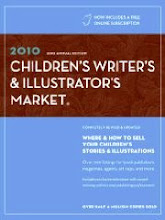 08 CWIM Excerpt: Deborah Ruddell...
08 CWIM Excerpt: Deborah Ruddell...
For picture books author/poet Deborah Ruddell a critique meeting with fellow poet Sonya Sones at the 2003 SCBWI Annual Summer Conference in Los Angeles resulted in Ruddell’s first book contract for her poetry collection Today at the Bluebird Café: A Branchful of Birds and her follow-up title A Whiff of Pine, a Hint of Skunk (both McElderry). Here’s she recounts her story. For the complete interview, see the 2008 CWIM (in stores soon--and available at the SCBWI Annual Summer Conference bookstore).
Your path to publication was rather unique—and pretty much every writer’s dream—finding an agent and getting a contract as the direct result of a conference critique. Can you recount your critique meeting with Sonya Sones?
After reading Sonya Sones’s brilliant and moving, Stop Pretending (HarperCollins), I couldn’t imagine what she would make of my poems. She writes important YA novels in verse and I had submitted a collection of rhyming poems about birds intended for younger children. I thought she would tell me to go back to Peoria and write about something that mattered.
Instead…Sonya started our meeting by telling me that she wanted to read something that she had come across recently—“something lovely.” I prepared myself to hear a famous poet’s perfect poem, aimed at giving me something to strive for. She proceeded to read my own poem about a cardinal. Believe me, it had never sounded better. I did what any professional would do under the circumstances: I cried.
As I blubbered, Sonya handed me several e-mails to read. The first one was from the acclaimed poet and anthologist, Lee Bennett Hopkins. Sonya had read some of my poems to him over the phone, and the e-mail was his response to that call. I thought I read the words “exquisite” and “publisher,” but I couldn’t be sure because whole paragraphs seemed to be swimming across the page.
After that, the room went all wobbly. I’m embarrassed to recall that I put my head down on the table and told Sonya that I was no longer capable of reading. So she told me that, on Mr. Hopkins’s advice, she had e-mailed Emma Dryden at McElderry Books to ask if she would like to see my work. This being a psychedelic daydream, Emma naturally said yes.
Sonya went on to say that she wanted me to meet her agent. (At this point, I half-expected her to add, “And then, I’ll introduce you to the real Santa Claus! What do you think of that?” I mean, hadn’t she done enough?)
I nodded weakly and we held hands across the table the way you do when someone changes your life, and you both know it.
Tell me about your initial meeting with your agent, and how he came to represent both you and your twin sister.
Sonya introduced me to her agent, Steven Malk, shortly after the big critique, and we agreed to meet the next morning in the hotel lobby. He asked me to bring any work that I had with me (Hooray! I had brought it to L.A.!), so I took all of my poems and a picture book dummy illustrated by my twin sister, Robin Luebs. During our brief meeting, Steven looked over the materials without too much comment, told me a bit about himself, and said he would call me the following week—which he did, with an offer of representation for both of us.
Why did you decide to attend that “magical” SCBWI conference? Had you been to such events before? What kind of involvement did you have in SCBWI before the L.A. conference?
I went to my first SCBWI national conference in 2000 all by myself, which was an overwhelming experience. I had a very positive critique with a well-known editor, but nothing ever came of it—partly, I think, because I was inexperienced and dropped the ball. Then, in 2001, I found my fabulous critique partners through the Illinois SCBWI chapter. My work was improving, but I still had only one story in Highlights to my credit. By 2003, I thought I was ready to try L.A. one more time. My critique group helped me polish every poem, and I was off!
So do you recommend all aspiring children’s writers and illustrators attend SCBWI conferences? What tips can you offer for making the most of your conference-going experience?
There’s just no substitute for attending the L.A. conference. You learn about the industry firsthand from the experts, you make connections with other writers and illustrators, and you get inspired! But if you’re shy (like me), it helps to have a friend along. Also, I’d recommend packing in as much as you possibly can: go to every session you can squeeze in, listen with an open mind, take notes, get autographs, sip wine on the terrace, and have fun. Take all of your best work along, because you never know who might want to see it. (And if Sonya Sones does your critique, be prepared for anything!)
What advice would you offer aspiring writers of poetry for young readers? What’s your best advice on writing rhyme?
My best advice is to go to your library’s children’s poetry department and just dig in! When I was starting out, that’s where I discovered most of the wonderful writers who inspired me, and where I learned how terribly far I had to go. Trying to match the quality of the poems I read in the library forced me to ask more of myself, to try never to settle for the ordinary, and to be willing to revise with a ruthless eye.
Writing in rhyme can be tricky and deadly in so many ways: bad rhythm, forced rhyme, worn-out rhyme, etc. Reading your work out loud (especially into a tape recorder) can expose its flaws with brutal honesty. And of course, nothing beats a truth-telling critique group.







No comments:
Post a Comment